

What is the Past Tense of "Seek"? English Guide
English learners frequently encounter confusion with irregular verbs, and "seek" stands as a prime example of why mastering these forms matters for clear communication. The past tense of "seek" is "sought" – a transformation that defies standard -ed patterns and demands memorization rather than rule application. Understanding this irregular conjugation becomes critical when expressing past actions involving searching, pursuing, or requesting something. Native speakers use "sought" automatically, but learners who default to "seeked" immediately signal their non-native status, potentially undermining their credibility in professional or academic contexts.


What is the Verb Form of "Be"? Complete English Guide
The verb "be" stands as English grammar's most irregular and essential foundation—a linguistic cornerstone that defies conventional conjugation patterns while serving as the backbone of countless expressions. Understanding its forms isn't merely academic exercise; it's the difference between communicating with precision and stumbling through basic conversation. This matters because "be" appears in approximately 4% of all spoken English words, making it statistically the second most frequently used verb after auxiliary verbs. Yet despite its ubiquity, learners consistently struggle with its eight distinct forms, creating communication barriers that persist for years.
![What "In a Timely Manner" Means: Complete Guide [English]](/_next/image?url=https%3A%2F%2Fcdn.sanity.io%2Fimages%2F147z5m2d%2Fproduction%2F32d1bc223dfeefec5e8d4d37a3bb4aa0b37fc453-2240x1260.png&w=3840&q=75)

What "In a Timely Manner" Means: Complete Guide [English]
"In a timely manner" means completing something within an appropriate timeframe—not necessarily quickly, but at exactly the right time when it's needed or expected. This phrase appears most frequently in professional communication where precision and accountability matter. The phrase "in a timely manner" represents one of English's most contextually dependent expressions. Unlike concrete timeframes such as "within 24 hours" or "by Friday," this phrase deliberately avoids specificity while establishing clear expectation of appropriate timing. Understanding its nuanced meaning requires examining both its literal components and its practical application across different contexts.
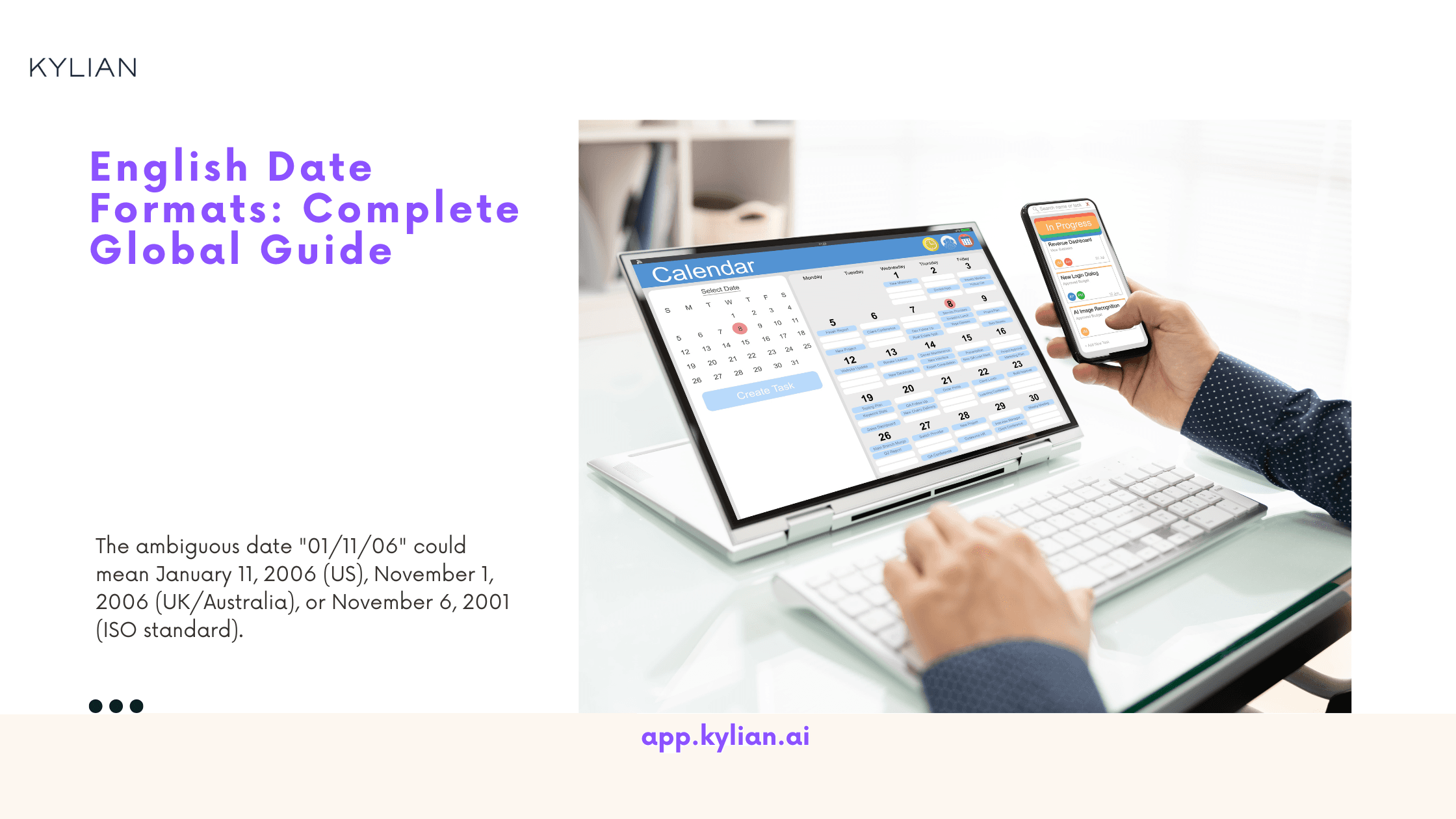

English Date Formats: Complete Global Guide
The ambiguous date "01/11/06" could mean January 11, 2006 (US), November 1, 2006 (UK/Australia), or November 6, 2001 (ISO standard). This demonstrates why understanding regional English date format variations matters for clear communication. Understanding date formats across English-speaking countries prevents costly miscommunication in international business, travel, and digital transactions. Each English variety follows distinct conventions that reflect historical development and regional preferences, creating three primary dating systems that serve over 1.5 billion English speakers worldwide.


"Belated Happy Birthday" vs "Happy Belated Birthday"
The grammar dilemma between "belated happy birthday" and "happy belated birthday" reveals a fascinating disconnect between linguistic logic and common usage patterns. While "happy belated birthday" receives over 2,200,000 Google results compared to only 330,000 for "belated happy birthday," the more popular version contradicts fundamental grammatical principles. This matters because clarity in communication—especially in professional settings—reflects competence and attention to detail.
![What Does TTTTTT Mean in English? [Complete Guide]](/_next/image?url=https%3A%2F%2Fcdn.sanity.io%2Fimages%2F147z5m2d%2Fproduction%2F866a0295cb608f286ecd8f5de90f02dd04926b42-2240x1260.png&w=3840&q=75)

What Does TTTTTT Mean in English? [Complete Guide]
The string "TTTTTT" represents one of the most misunderstood letter combinations in digital communication today. This specific sequence of six consecutive T's carries multiple meanings depending on context, platform, and user intent. Understanding these variations matters because misinterpretation can lead to communication breakdowns in professional and personal settings.
![What Does the Big Easy Mean? [English]](/_next/image?url=https%3A%2F%2Fcdn.sanity.io%2Fimages%2F147z5m2d%2Fproduction%2Ff0939794f1068c2d944b401b9356ccf4329bf2f2-2240x1260.png&w=3840&q=75)

What Does the Big Easy Mean? [English]
The Big Easy refers to New Orleans, Louisiana—a nickname that captures the city's relaxed, laid-back culture and slower pace of life. While it's widely recognized, locals rarely use this term, and it's considered informal for professional contexts. Understanding regional nicknames reveals cultural identity patterns that extend far beyond simple word choices. The Big Easy stands as one of America's most recognizable city nicknames, yet its origins remain contested among historians and linguists. This matters because nickname adoption reflects broader cultural narratives about place, identity, and how outsiders perceive communities versus how residents see themselves.


Weekdays in Norwegian: Master the Seven Days
Norwegian weekdays follow a fascinating pattern rooted in Norse mythology and Germanic traditions. Understanding these seven fundamental words becomes essential for anyone navigating Norwegian language, culture, and daily communication. This comprehensive analysis reveals not just the names, but the cultural significance, pronunciation nuances, and practical applications that make Norwegian weekdays distinct from their English counterparts.
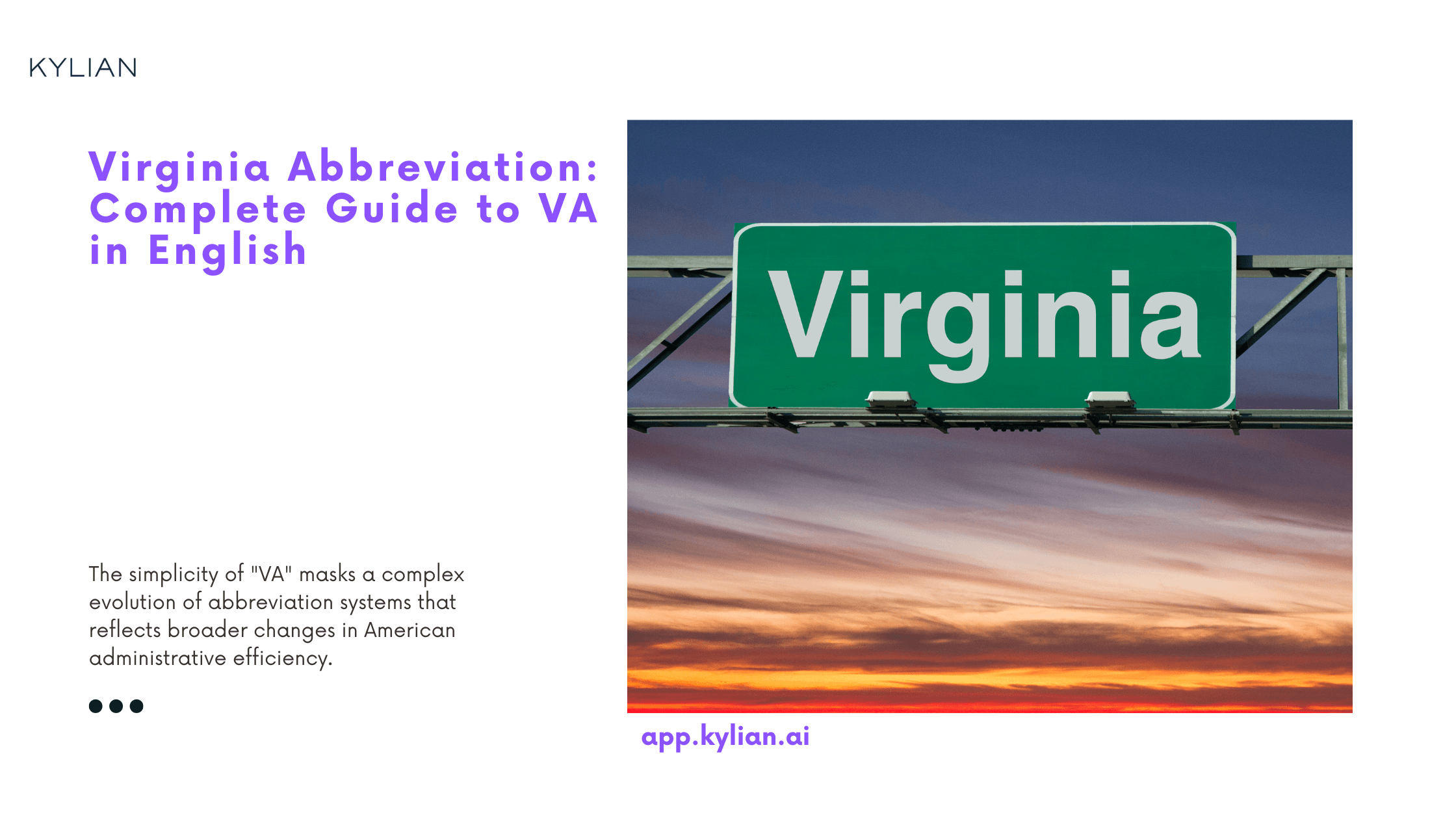

Virginia Abbreviation: Complete Guide to VA in English
When addressing mail, filling out forms, or writing about the Commonwealth of Virginia, knowing the correct abbreviation becomes essential. Virginia uses "VA" as its official two-letter postal abbreviation, established by the United States Postal Service in 1963. This standardized system revolutionized mail processing and remains the definitive abbreviation used across government, business, and personal correspondence today. The simplicity of "VA" masks a complex evolution of abbreviation systems that reflects broader changes in American administrative efficiency. Understanding these abbreviations goes beyond mere convenience—it represents how standardization shapes communication in modern society.


Grateful vs Greatful: Which English Spelling is Correct?
The English language presents us with a fundamental spelling distinction that reveals deeper truths about language evolution and learner psychology. "Grateful" represents the correct spelling, derived from the Latin "gratus" meaning pleasing or thankful, while "greatful" emerges as a persistent misspelling that exposes how phonetic intuition can mislead even experienced writers. This distinction matters because spelling accuracy directly impacts professional credibility and communication effectiveness. When executives review proposals containing "greatful," they question attention to detail. When students submit essays with this error, educators mark down grades. The stakes extend beyond academic or professional contexts—accurate spelling builds trust in digital communications where first impressions form within seconds.


How to Translate "Silly" into Spanish?
Spanish learners frequently encounter "silly" in English conversations but struggle to find an equivalent that captures its precise meaning and tone. The challenge isn't simply vocabulary—it's understanding how Spanish speakers conceptualize playfulness, foolishness, and lighthearted criticism across different social contexts. The direct translation problem reveals a deeper linguistic reality: "silly" carries cultural undertones that don't map neatly onto Spanish equivalents. While "tonto" might seem like the obvious choice, this approach misses the nuanced spectrum of meanings that native Spanish speakers navigate effortlessly. Understanding this translation requires examining not just individual words, but the social dynamics they represent. Spanish distinguishes between playful foolishness, endearing naivety, and genuine criticism in ways that English speakers often overlook. This distinction matters because choosing the wrong equivalent can shift your intended tone from affectionate teasing to harsh judgment.
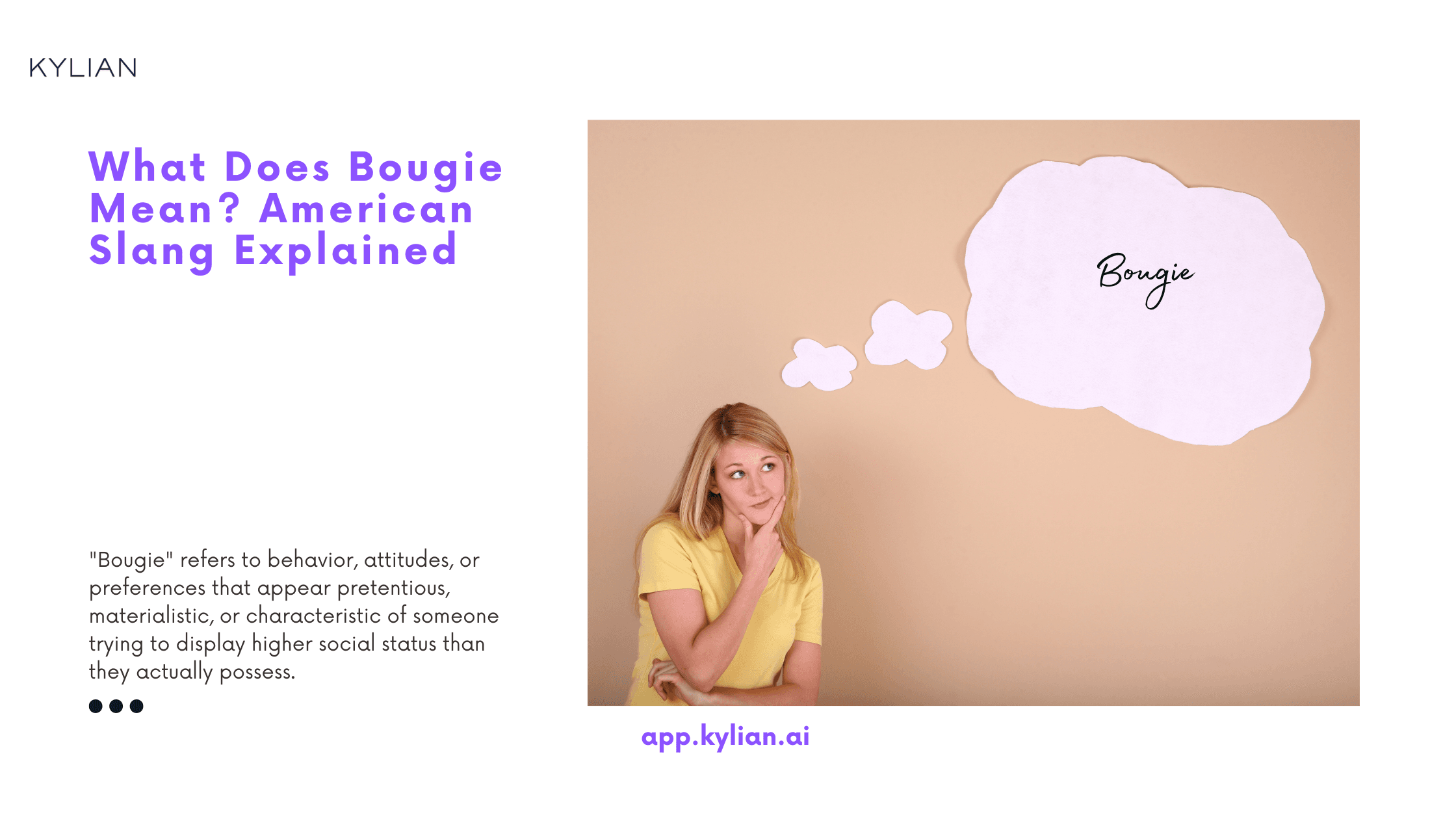

What Does Bougie Mean? American Slang Explained
So you hear American English speakers say "bougie" but don't know what it means? The confusion is understandable. This term carries complex social, economic, and cultural implications that extend far beyond its dictionary definition. "Bougie" refers to behavior, attitudes, or preferences that appear pretentious, materialistic, or characteristic of someone trying to display higher social status than they actually possess. The term's power lies in its ability to simultaneously critique and categorize social behavior, making it essential for anyone seeking to understand contemporary American cultural dynamics.
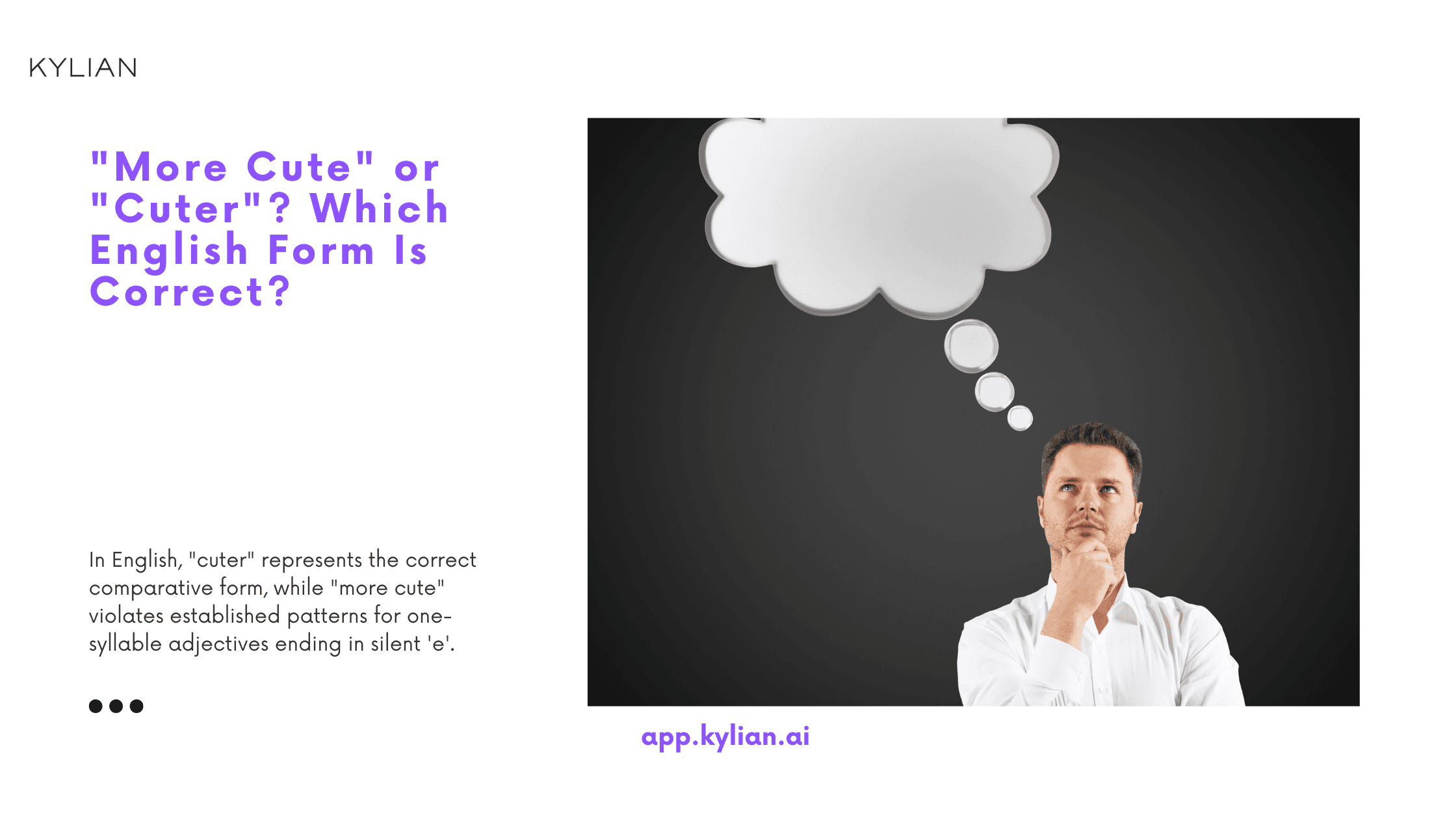

"More Cute" or "Cuter"? Which English Form Is Correct?
English speakers encounter a fundamental choice when intensifying the adjective "cute": should they say "more cute" or "cuter"? Both forms appear in conversation, yet only one follows standard grammatical rules. In English, "cuter" represents the correct comparative form, while "more cute" violates established patterns for one-syllable adjectives ending in silent 'e'. This distinction matters because comparative adjective formation follows predictable rules that, once mastered, eliminate uncertainty across hundreds of similar word pairs.


Mastering "In Which," "Of Which," "At Which," "To Which"
English relative pronouns create precision where ambiguity once existed. Among these linguistic tools, "in which," "of which," "at which," and "to which" function as connective bridges that transform fragmented thoughts into cohesive, sophisticated expression. These prepositional relative pronouns don't merely link clauses—they establish relationships that clarify location, possession, timing, and direction with surgical accuracy. The strategic deployment of these constructions separates competent English users from those who achieve true fluency. Understanding when "of which" conveys possession versus when "in which" indicates circumstance determines whether your communication achieves professional polish or remains functionally adequate.


What Are You Up To? Complete English Guide
So you hear English native speakers say "What are you up to?" but struggle to grasp its full meaning? This phrase carries significantly more weight than its simple structure suggests. "What are you up to?" functions as both a casual greeting and a genuine inquiry about someone's current activities or plans, but its usage extends far beyond surface-level conversation. The phrase operates on multiple linguistic levels simultaneously—serving as a social lubricant, an information-gathering tool, and a relationship-building mechanism. Understanding when and how to deploy this expression separates intermediate English learners from those who truly comprehend the subtleties of native-level communication.
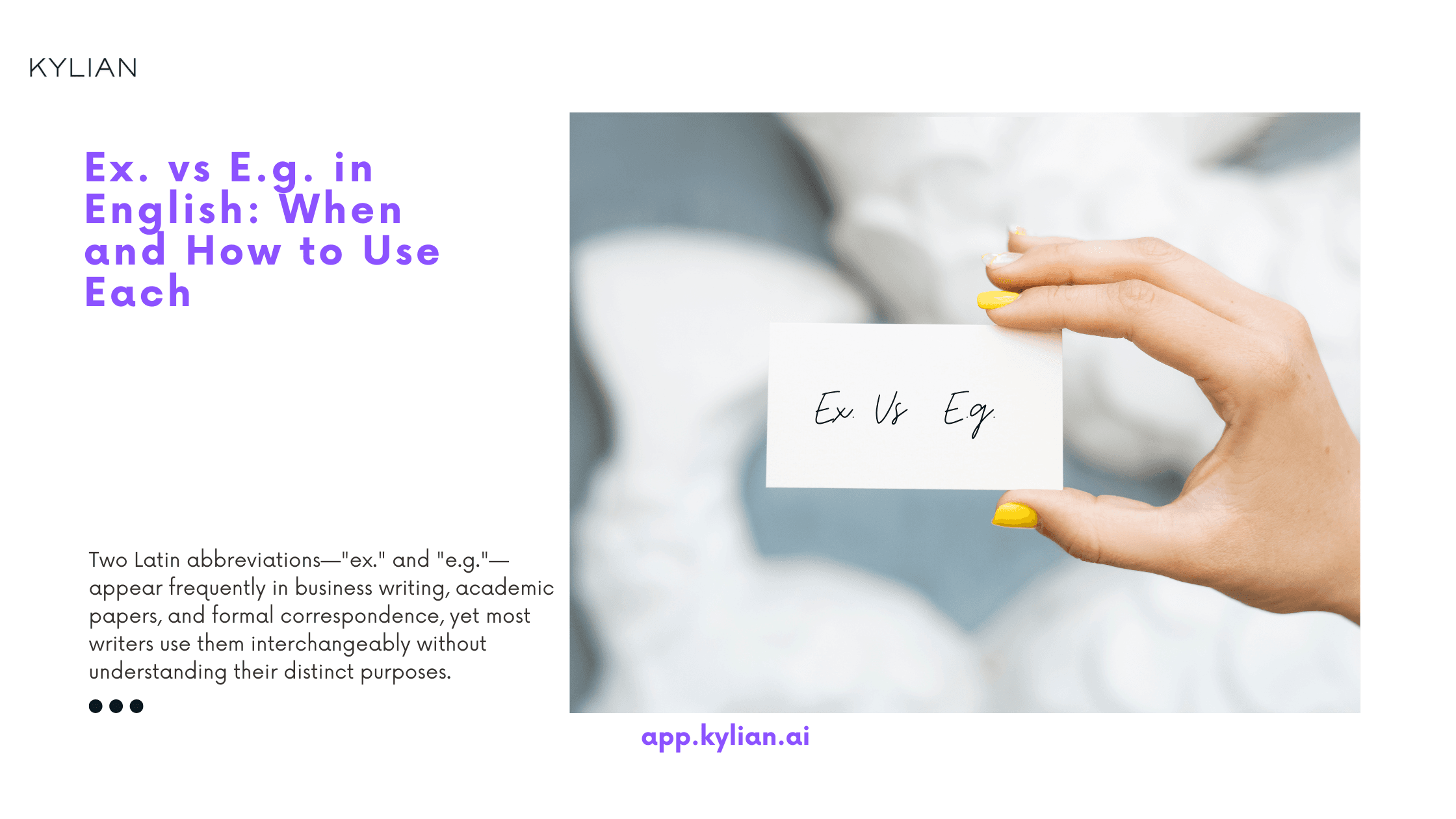

Ex. vs E.g. in English: When and How to Use Each
Professional communication demands precision. Two Latin abbreviations—"ex." and "e.g."—appear frequently in business writing, academic papers, and formal correspondence, yet most writers use them interchangeably without understanding their distinct purposes. This confusion undermines clarity and can distort meaning in critical communications. In English, "ex." derives from the Latin "exempli gratia" meaning "for the sake of example," while "e.g." comes from "exempli gratia" meaning "for example." The distinction matters because precision in language directly correlates with professional credibility and effective communication outcomes.


What Does the Term 'Holibobs' Mean? English
The British linguistic landscape presents a fascinating paradox: a nation that produced Shakespeare and formal diplomatic protocols simultaneously embraces terms like "holibobs" to describe something as universal as holidays. This seemingly innocent word reveals deeper cultural tensions about class, authenticity, and social identity in contemporary Britain. Bottom Line: Holibobs is British slang meaning "holidays" or "vacation," used informally and often viewed as either endearingly playful or irritatingly contrived, depending on one's perspective and social positioning.
![People That or People Who: Grammar Guide [English]](/_next/image?url=https%3A%2F%2Fcdn.sanity.io%2Fimages%2F147z5m2d%2Fproduction%2F350398072ca28f4bc7565f0ab88e1f23c38c8210-2240x1260.png&w=3840&q=75)

People That or People Who: Grammar Guide [English]
Grammar precision matters more than most realize. When referring to individuals, the choice between "people that" and "people who" carries weight beyond mere stylistic preference. This distinction reflects deeper principles of English grammar that impact clarity, professionalism, and reader comprehension. The question emerges repeatedly across academic writing, professional communication, and everyday discourse. Understanding this grammatical principle transforms how writers approach human references, elevating both precision and readability in their work.


But Rather or Instead? When to Use Each in English
The distinction between "but rather" and "instead" represents one of the most nuanced areas of English grammar that even advanced speakers struggle with. These expressions appear interchangeable on the surface, yet their proper usage follows specific grammatical rules that can dramatically impact the clarity and sophistication of your communication. Understanding when to deploy each phrase isn't merely an academic exercise—it's a practical skill that separates competent writers from exceptional ones. The choice between these constructions affects sentence flow, emphasis, and the relationship between contrasting ideas in ways that readers perceive, even when they can't articulate why one version sounds more polished than another.


10 Ways to Use the English Word Go in Phrasal Verbs
English phrasal verbs represent one of the most challenging aspects of language mastery for non-native speakers. Among the thousands of phrasal verb combinations that exist, those formed with "go" stand out as particularly essential for fluent communication. The reason is simple: "go" phrasal verbs appear in everyday conversations, business communications, and academic writing with remarkable frequency. Understanding these constructions isn't merely about expanding vocabulary—it's about unlocking natural expression patterns that native speakers use instinctively. When you master "go" phrasal verbs, you bridge the gap between textbook English and authentic communication. The complexity of phrasal verbs lies in their unpredictable meanings. Unlike regular verbs where the meaning often derives logically from its components, phrasal verbs create entirely new semantic territories. This linguistic phenomenon makes them both fascinating and frustrating for learners.
![What is the Meaning of ‘Forged Through Fire’? [English]](/_next/image?url=https%3A%2F%2Fcdn.sanity.io%2Fimages%2F147z5m2d%2Fproduction%2F9d30be0f07bbfa3b71addaf12d8f760a9458a049-2240x1260.png&w=3840&q=75)

What is the Meaning of ‘Forged Through Fire’? [English]
Language reveals truth about human experience in ways that transcend mere communication. The idiom "forged through fire" captures something fundamental about how strength emerges from adversity—a concept so universal that it appears across cultures, yet so specific in its imagery that it demands deeper examination. This phrase matters now because we live in an era where resilience has become currency. Whether discussing organizational transformation, personal development, or leadership effectiveness, understanding the precise meaning and application of "forged through fire" provides clarity in contexts where precision determines outcomes.


How to Use 'Than' and 'Then' in English
The English language presents writers with countless opportunities to stumble over seemingly simple words. Among these linguistic pitfalls, the confusion between "than" and "then" ranks as one of the most persistent—and costly—mistakes in professional communication. This confusion matters more now than ever. Professional credibility hinges on precise communication, and grammatical errors in digital correspondence can undermine authority instantly. The stakes are particularly high when these errors appear in client communications, marketing materials, or academic submissions where precision signals competence. Understanding when to use "than" versus "then" requires grasping their fundamental grammatical roles. "Than" functions exclusively as a conjunction or preposition in comparative statements, while "then" operates as an adverb indicating temporal sequence or logical consequence. The distinction seems straightforward, yet native speakers continue making this error with alarming frequency.
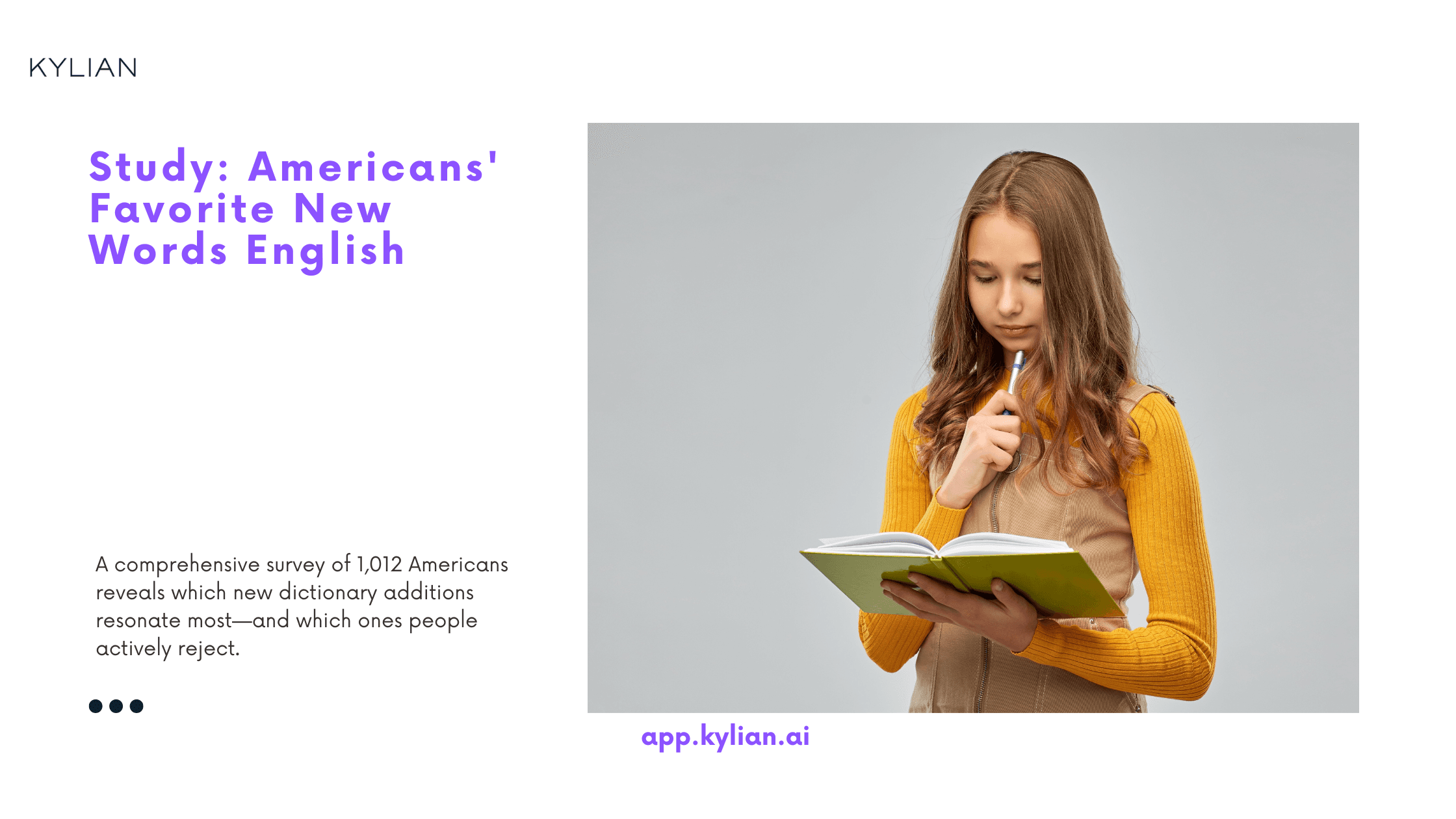

Study: Americans' Favorite New Words English
Language evolution happens whether we acknowledge it or not. Dictionary.com added over 200 words in the past year, reflecting how rapidly English adapts to cultural shifts, technological advances, and generational changes. A comprehensive survey of 1,012 Americans reveals which new dictionary additions resonate most—and which ones people actively reject. The data exposes fascinating generational divides, political tensions, and practical preferences that shape how Americans embrace linguistic change. Understanding these patterns matters for educators, content creators, and anyone navigating modern English communication.
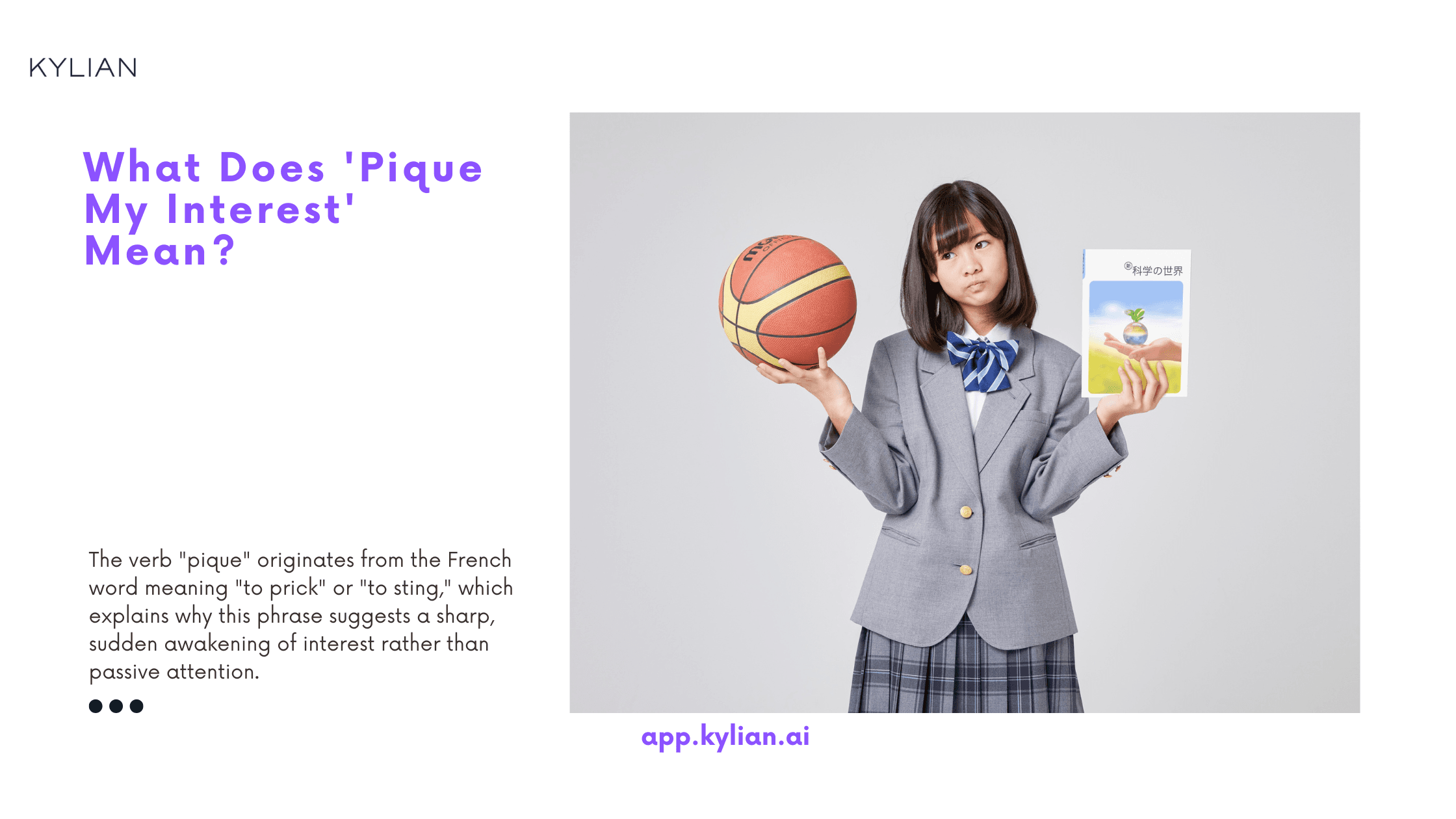

What Does 'Pique My Interest' Mean?
You've encountered native English speakers using "pique my interest" in conversations, emails, or presentations, yet the meaning remains unclear? This expression carries nuanced implications that extend far beyond simple curiosity. "Pique my interest" means to stimulate, arouse, or provoke someone's curiosity or attention in a way that demands further exploration or consideration. The verb "pique" originates from the French word meaning "to prick" or "to sting," which explains why this phrase suggests a sharp, sudden awakening of interest rather than passive attention. When something piques your interest, it creates an intellectual or emotional stimulation that compels you to learn more, investigate further, or engage more deeply with the subject matter.